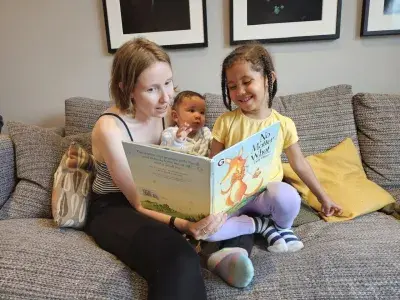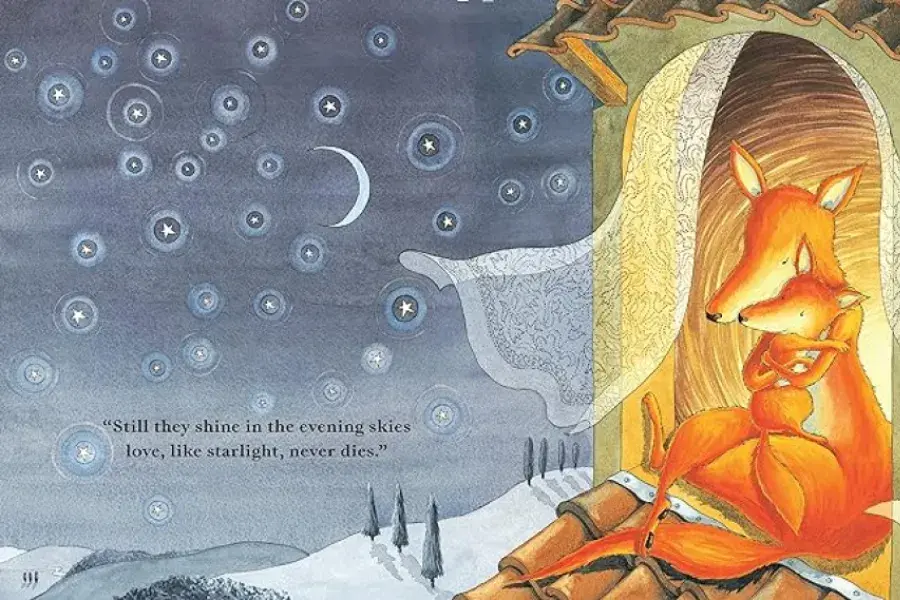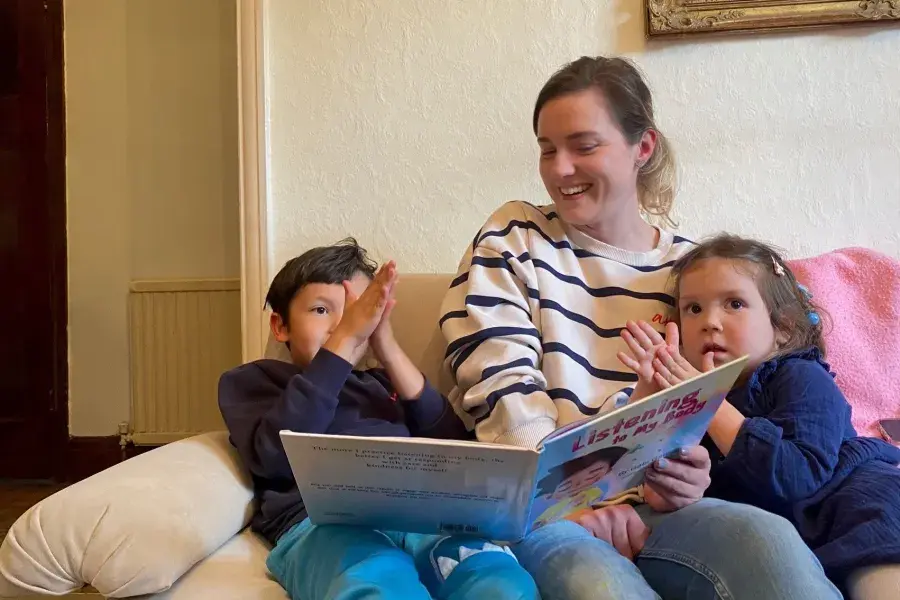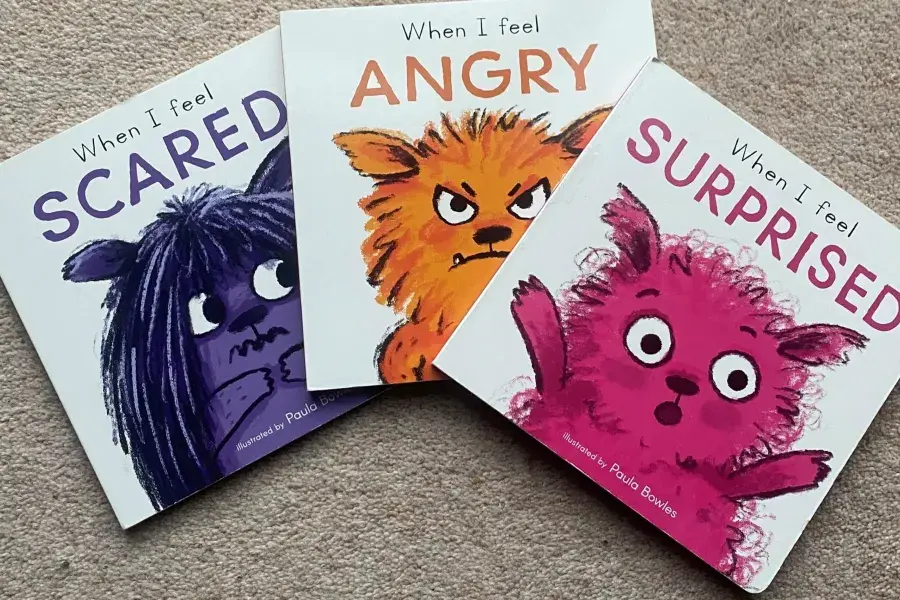No Matter What: A Comforting Classic to Reassure Your Child
The book we are featuring in today’s part of our series on resources to support emotional regulation is a bit different, in that it is not a direct examination of emotions but simply a comforting short story. Debi Gliori’s beautifully illustrated children’s picture book No Matter What describes itself as ‘a very loving book about setting big worries to rest’.
First published in 1999 and recently repackaged into a 25th anniversary edition, the message is about the unconditional love a parent feels for their child. The big fox (‘Large’) comforts their little fox (‘Small’) when they find themselves in a dark place. By repeating ‘I’ll always love you, no matter what’ in response to all of Small’s relentless ‘what if’ questions, Large reassures Small that nothing will change that love, even death.
Parents’ Perspectives
A mother from our community shared these reflections on how she found comfort in the book when struggling with her neurodivergent child:
There were times when I was so tired and just couldn't cope with my young autistic child anymore. I could not even feel my love anymore. It made me feel guilty. But every night for months, I would read ‘No Matter What'. It helped me keep going. I thought, 'No matter what, even when I don't feel my love anymore because I am so tired, I know it is there.
This book helped me let my child know that no matter what, I would be there. It helped me remember that I could love my child, no matter what.

Our volunteer, Rachel, who has two children under five, shares her experience with the book:
I thought ‘No Matter What’ was wonderful. This deceptively simple rhyming story unexpectedly cut deeply, bringing tears to my eyes on more than one occasion while reading it to my daughters. The characters are androgynous, which means it can work for any family situation. I would recommend it as a suitable story to read to even very young children who for whatever reason might find themselves questioning whether there are limits to their parent’s love.
Whether they are going through a time of change or have been struggling with their own feelings and moods, the book’s steadfast refrain will provide your child with a source of comfort, whilst also reminding you of the important role you play in always being there for them, no matter what.
Click here to purchase a copy of No Matter What (affiliate link)
An interview with the author
Earlier this year, Rachel was honoured to have the opportunity to connect with Debi over a Zoom call. She writes:
We explored how No Matter What came to life and chatted more generally about topics ranging from publishing to parenting. Here are some of the highlights of our conversation:
Rachel: What inspired you to write No Matter What?
Debi: I can clearly remember. I was in the middle of a messy divorce. [My then-husband and I] had been going to counselling to try and dial down the aggression between us, so that [our two] children wouldn't be too adversely affected. However, I could see that my youngest daughter was. At 18 months old, she was verbal, but not very verbal, so she wasn't very good at expressing her feelings. She could act them out [in the form of epic meltdowns] but she stopped talking completely. The whole situation was affecting her very, very badly.
In the process of getting myself together, I found myself thinking how can I let her know that this is okay, we can support her, and we understand the epic meltdowns? It’s horrible when your world, that you thought was 100% solid, turns out to be so fragile that it just falls apart, and you're too little to have any agency whatsoever over what happens next.
I wondered if I could write her a story that when I read it to her, she would understand on some deep emotional level that no matter how badly she behaved, she was loved and that love was completely and utterly unconditional.
[At first,] I had no idea that I was writing a book. I was just trying to write down a series of stanzas that would make my daughter feel better. I disguised the characters by calling the parent Large and the small person Small. That gave the story a universal form, because it wasn't about mothers and daughters. It wasn't about fathers and sons. It was about large carers and small, helpless people who were, temporarily, completely beside themselves.
I wrote it faster than I've ever written anything in my life, and I wrote with such assurance. I finished it in 20 minutes. When I read it through, I thought, that is exactly what a small person needs to hear. It's every bit as much of a miracle to me as it is to people who really love it. I have no idea how I managed to write it, and I'm so glad that I did.
Did it help you too, as a parent?
My intention in writing the book was to calm my daughter down and minimise the hurt that she was going through, enabling her to see that, no matter what, I'd always love her. But it could equally be seen as a massive exercise in self-regulation.
Parenthood is such a tough gig. It pushes us to our absolute limits. Children know which buttons to push, and when those buttons get pushed, it really hurts.
When you are parenting a small person who hasn't learned to self-regulate, if you enter their world, empathising with what's going on in their head, you end up in the same state yourself. Becoming less like a grown up and more like an unregulated being, absolutely swept away by the force of your own feelings.
At times, when you're playing, that is marvellous. It is exactly what a small person needs: a great big, safe playmate who can be as surreal and crazy as they are. But they don't need that all the time. They also need you to step back, assume a proper adult shape, and calm everything down again. I think No Matter What does that, in that Large plays along, but is actually fairly well regulated to be the best parent possible for Small. I'm aware that Large represents the council of perfection, and none of us ever could measure up.
Given the personal circumstances from which the story emerged, I am guessing you didn’t explicitly consider the potential wider audience for No Matter What at the time of writing?
I didn't. But when I read it again, I thought, I've written something that is going to have a wide appeal for many, many people. Of course I had no idea then how wide. It works for very small people, it works for tormented teenagers, and it works for adults. It has even been used as wedding vows, and by celebrants at funerals, because it is very comforting and speaks of the hereafter in a totally secular fashion.
Will we ever hear more from Large and Small?
Despite having said I'd never write another one ever, then came the pandemic, with the desperate situation and darkness and all of that. A really nice couple of lines came into my head, and I thought, ‘Oh, my goodness! A companion book to No Matter What! I could go back, and I could play with my foxes again. I could write more about them.’
My new book, Come What May, will probably be out this time next year [summer 2025]. I’ve just handed it in. It’s even more about mood and about managing when everything goes to hell in a handbasket.
That certainly sounds like a situation I can relate to as a parent! Can you share any other book recommendations, particularly ones that might be helpful for young people with a neurodivergence and their supporters?
There may not have been stories like No Matter What around when I was growing up. But we find the stories we need, to allow us to make sense of this crazy world.
I was very into books and reading from an early age, and my go-to was Hans Christian Andersen. The Hans Christian Andersen stories are absolutely beautiful. There is something in all of those stories for a child that doesn't feel they fit in or belong, who feels like they've been beamed down from another planet.
I'm very much on the on the side of the neurodiverse, because I really believe that we wouldn't advance as a society without outliers, people who don't see things exactly the same way as the herd. People who can see beyond what is supposedly socially acceptable, or what we've always done. Behind just about any breakthrough in any field there is probably a person who has felt that they are not made of the same stuff as the rest of humanity.
---
As someone who has fallen in love with No Matter What, I am eagerly awaiting the publication of Debi’s upcoming companion book, Come What May. If you would like to purchase any of the books mentioned in this review, please take a moment to raise a free donation for The Neurodiversity Family Hub by using our affiliate links above to purchase through Waterstones, or purchasing through our easyfundraising page and searching for your preferred online retailer.




